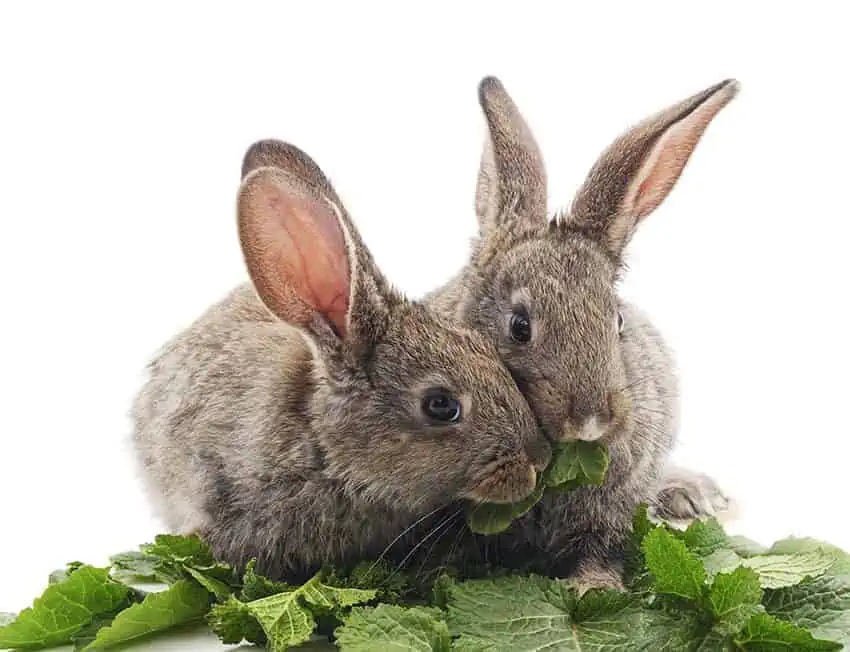
Perhaps it’s Bugs Bunny’s fault that we associate carrots as being the perfect food for our rabbits. In every cartoon, Bugs totes a bright orange carrot as he utters his catchphrase – ‘what’s up doc?’. In fact, rabbits don’t naturally eat root vegetables and too many carrots could lead to a visit to the bunny doctor. So, what other foods should bunny owners avoid giving to their pets?
LETTUCE – Some types of lettuce, such as iceberg, contain lactucarium, which can be harmful to rabbits in large quantities. Light-coloured lettuce varieties are high in water and have very little nutritional value and will probably just give your rabbits the runs.
CHARD – It’s a leafy green but not one that rabbits can tolerate, causing colic and bloating.
FRUIT – Rabbits don’t naturally eat fruit, which is high in sugar, so it shouldn’t be a regular part of their diet. Avocado, which might seem like the perfect rabbit snack food, is fatty and should never be included in your rabbit’s diet. Also steer clear of rhubarb – a common garden plant that can be poisonous to animals if eaten raw. A cube of apple as an occasional treat is as fruity as it should get for bunnies.
GRASS CUTTINGS – Rabbits should be given unlimited access to steadily graze on fresh grass, just as they would in the wild, but doling out a pile of grass cuttings for them to demolish can be very harmful to them.
BREAD, PASTA AND CRACKERS – High-carb foods like these can cause series stomach issues including enterotoxaemia – a toxic overgrowth of bad bacteria in the intestinal tract.
NUTS – You’d have to be if you give your bunny walnuts or the like – all nuts are high in fat not fibre and will give your rabbits extremely uncomfortable indigestion.
RABBIT MUESLI – While we humans think this looks like a tasty nibbling mixture, commercial rabbit muesli is more about marketing than nutrition and causes teeth and gut problems, obesity and reduces hay and water intake. Avoid.
So, what should you be feeding your rabbits?
According to the Rabbit Welfare Association, the ideal bunny diet should consist of:
- 80% (at least) unlimited grass or high quality feeding hay (not bedding hay, which may have poor nutritional value)
- 15% should be a variety of rabbit-safe leafy greens, vegetables and herbs such as carrot tops, cauliflower leaves, kale, mint, romaine lettuce, dandelion leaves, plantain, hawthorne, bramble and leaves from hazel, willow or apple trees You can find a list of recommended vegetables and herbs at rabbitwelfare.co.uk
- 5% of pelleted rabbit food – which is about one egg cup a day. This ensures they get all the vitamins and minerals they need
Sadly, the 2017 PDSA PAW Report, which tracks the health and wellbeing of pets in the UK, reveals that 31% of rabbits are still not eating enough hay. High quality feeding hay is particularly important as it provides fibre to help maintain a healthy gut and serves to grind down continuously growing teeth, helping to prevent dental disease. Find out more about the difference between feeding hay and bedding hay here
Don’t forget that rabbits also need fresh, clean drinking water, which should be checked every morning and evening. You can find more rabbit nutritional advice and details of the Excel 5 Stage feeding plan, recommended by vets, here
Would you like to help us to help more rabbits have a better diet?
If so, why not spread the word! Share this information with your rabbit-loving friends so that their pets also get the nutrition they need to be healthy, happy bunnies. You can also find lots more tips and advice on caring for your rabbits on social media.
- Facebook.com/rabbitawarenessweek
- Twitter: @rabbitawareness
- Website: Rabbitawarenessweek
Sources: rspca.org.uk, rabbitwelfare.co.uk, pdsa.org.uk, peta.org














